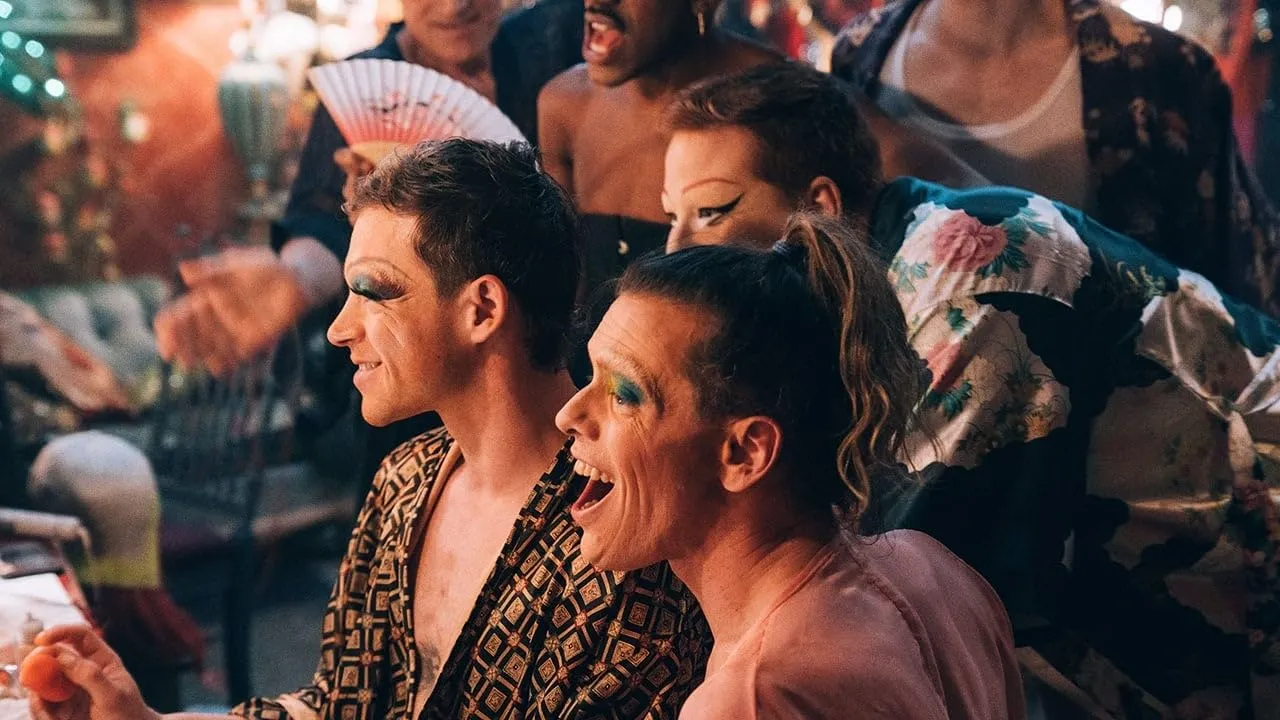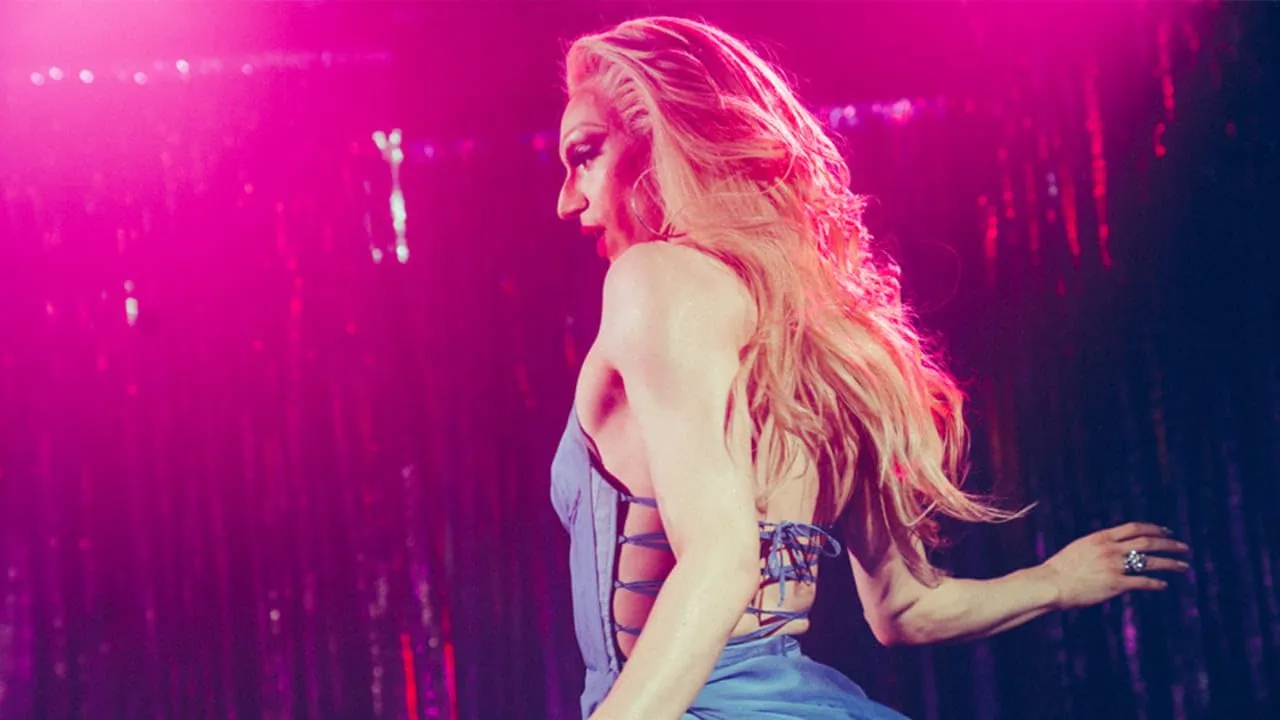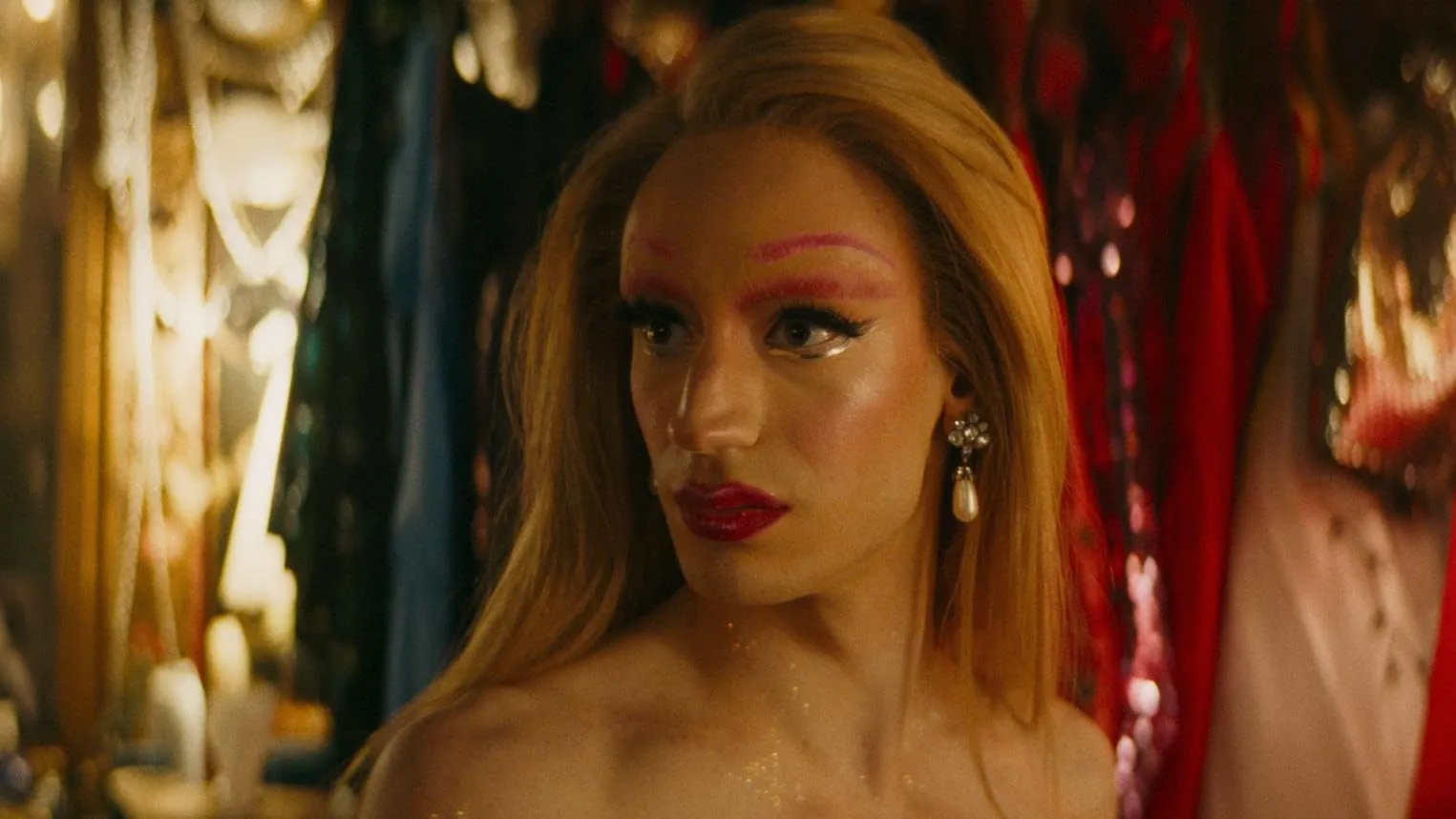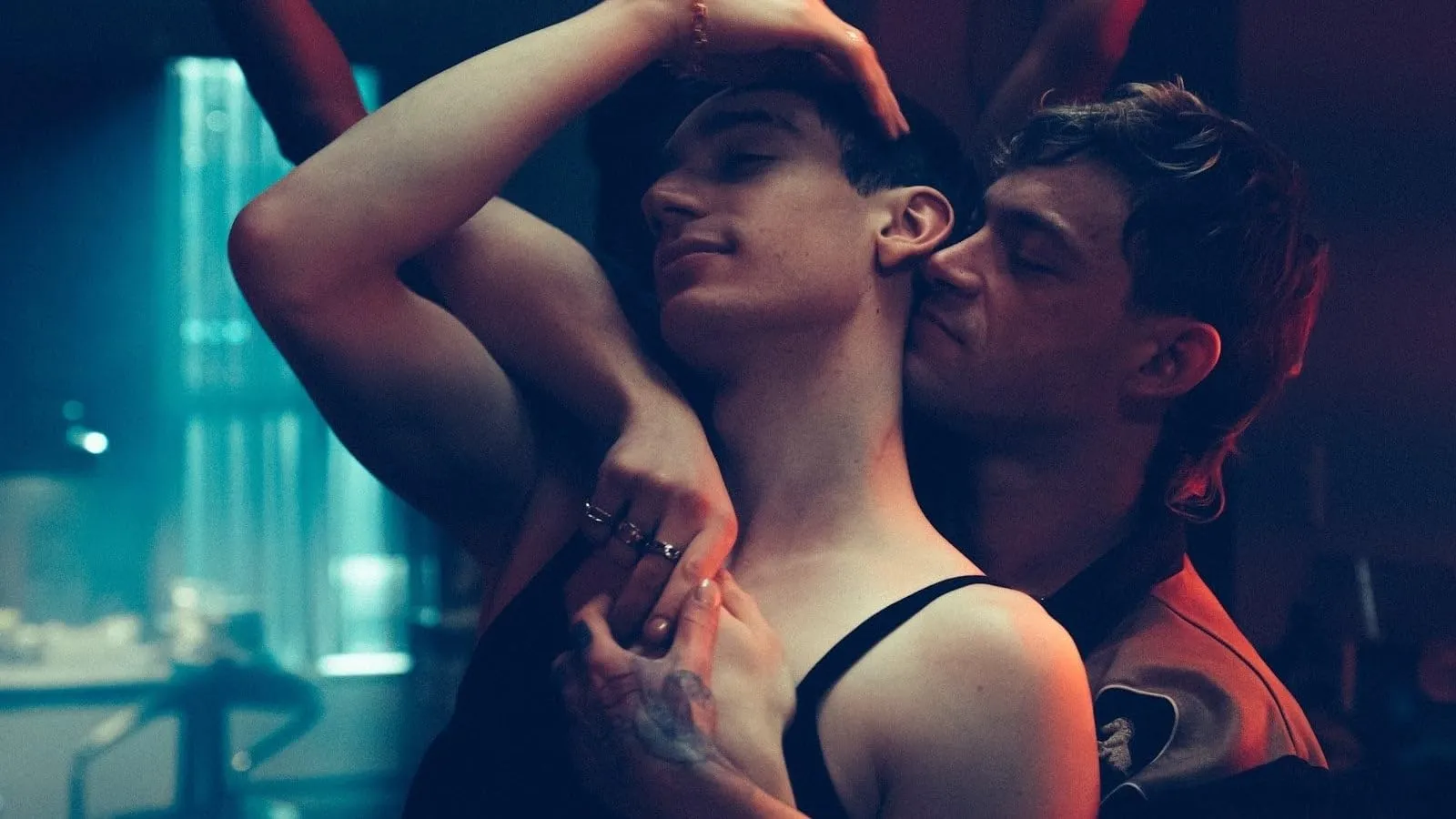Théodore Pellerin is mesmerizing as Simon, a gifted drag queen coming into his own in Montreal’s lively performance scene. Writer-director Sophie Dupuis, collaborating once more with Pellerin, crafts a tender portrait of her protagonist navigating rocky relationships.
We meet Simon delighting audiences with his alter-ego Glory Gore, gliding gracefully across the stage. But challenges await off-stage as he falls for the charming yet volatile Olivier, played by Félix Maritaud with nuanced flair. Just as this new romance takes flight, Simon’s estranged mother Claire, an opera diva, promises a reconnection that proves bittersweet at best.
Dupuis follows her character’s emotional odyssey with empathy and care. Through vivid choreography and costumes, she brings us straight into Simon’s dazzling world of drag while keeping us invested in the messier matters of the heart. Pellerin excels at conveying his character’s vulnerability, radiating warmth even in Simon’s darkest moments of doubt.
Around him, a superb cast, including Anne-Marie Cadieux’s complex take on the flawed yet compelling Claire, brings these flawed yet compelling characters to life. Tracking Simon’s journey with gentle authenticity, Solo emerges as a poignant portrait of one performer learning to embrace their talent and worth.
Tracking Heartlines
Théodore Pellerin is mesmerizing as Simon, a gifted makeup artist who dazzles Montreal audiences each night as his drag alter ego Glory Gore. Here filmmaker Sophie Dupuis crafts an intimate portrait following her protagonist as new connections take flight and past wounds resurface.
We’re introduced to Simon delighting crowds and bonding with fellow queens at their lively cabaret. But challenges soon arise when French performer Olivier joins the group. A magnetic chemistry sparks between the pair, yet Olivier proves volatile. As their romance and professional partnership blossom, he grows possessive and cruel.
Just as Olivier consumes more of Simon’s life, his mother Claire returns after years apart. An acclaimed opera singer, Claire brought Simon joy through music yet abandoned him for her career. Hoping to reconnect, Simon finds Claire distant and self-absorbed, cutting their rare meetings frustratingly short.
Dupuis follows these twisting relationships with empathy. Through passionate performances and heartfelt interludes, we feel Simon’s spirit soar alongside his growing confusion and isolation. Olivier belittles his passion and works to dismantle bonds with loved ones. Claire offers fleeting affection yet neglects his deeper needs.
Alone in a changing world of his own making, Simon reaches his breaking point. But in hitting rock bottom, his resilience shines through. With support from sister Maude and their community, he finds strength within. His final piece, a breathtaking homage to mother and self, marks his rebirth. Emerging from darkness through triumphant song, Simon rediscovers his talent and worth on his own terms.
Tracking Simon’s journey with care, Solo offers a tender portrait of one finding inner light, even in life’s shadowlands. Pellerin excels at conveying humanity in all its messy complexity.
Lights, Camera, Fashion
Writer-director Sophie Dupuis brings the world of Montreal drag to life with Verve in Solo. Authenticity is her aim, and she achieves this through attentive direction that feels insightful and unforced. Dupuis surrounds herself with advisors from the scene, helping her craft performances and spaces that ring true.
She approaches the drag performances not as mere backdrops but as narrative drivers. Through these vibrant numbers, we see Simon’s fluctuating confidence and creativity. Technical excellence underscores emotional authenticity, as DP Mathieu Laverdière’s slithery camera envelops the queens in a dazzle of colors. Lighting designer Étienne Beaulieu floods stages with fuchsias and golds that uplift while intimating each queen’s inner glow.
Costume designer Cédric Quenneville outdoes with extravagant looks befitting star turns. Simon’s creations by sister Maude dazzle in chiffons, ruffles, and radiant hues. As his relationship with Olivier sours, tension creeps into their glitzy duets. By the film’s inspiring end, a rousing solo signals Simon’s rebirth through self-assured style.
Production values shine in deepening our connection to the characters and their world. Visual panache aligns with Dupuis’ care for authentic portraiture, as she follows her figures with empathy and allows their humanity to emerge freely. Through her skilled direction and collaborative team, Solo brings us straight into the heart of Montreal Drag, a vibrant community where creative souls find joy and self-acceptance.
On Stage and Off, Pellerin Captivates
Théodore Pellerin brings Simon to life with captivating honesty in Solo. Across highs and lows, he ensures viewers feel every emotion alongside our complex hero.
Through Simon’s on-stage transformations, Pellerin dazzles. Whether serving cascading hair flips to ABBA or laying bare heartache through an intimate French ballad, Pellerin commands attention with captivating stage presence. But he transports us deeper still. Beyond flashy costumes and wigs, we see how each number reflects Simon’s shifting confidence and creative spirit.
Off stage, Pellerin proves just as compelling. He gifts Simon tender vulnerability, baring the character’s longing to love and be loved in turn. But Pellerin shows too how neglect shapes Simon, making him desperate for validation. His wide, expressive eyes tell whole stories of hope and hurt with minimal words.
No moment feels false or overplayed. Pellerin trusts the subtlety of Simon’s journey, allowing him to emerge messy yet relatable. Even as Simon makes mistakes in relationships, Pellerin ensures empathy. He makes clear how each error stems from damaged self-worth, not malice. Through it all, Pellerin imbues Simon with deep humanity, proving why his success on drag’s biggest stages feels so deserved.
Alongside Pellerin, Felix Maritaud subtly unsettles as Olivier. He unveils the character’s manipulation not through crude actions but gradual words and acts revealing selfishness over time. Maritaud makes Olivier’s toxicity feel distressingly plausible through charms both grand and petite.
As Simon’s aloof mother, Anne-Marie Cadieux delivers complexities within limitation. Through brevity and indifference, Cadieux shows a woman disengaged by fame and life’s demands rather than cruelty alone. She brings nuance to a figure who disappoints without demonizing.
Together, this talented trio immerses us in Simon’s world, ensuring each emotional beat lands with meaningful impact. They prove that even within smaller independent films, true star quality lies not in flash but in authenticity, empathy, and craft. Solo benefits immensely from their gifts, becoming a deeply impactful and unforgettably human story as a result.
Expressing Truth Through Transformations
What does it mean to truly know yourself? This question lies at the heart of Solo’s exploration. Through Simon’s journey, the film examines how easily one can lose sight of identity amid life’s pleasures and pains.
Simon channels his search for acceptance into dazzling drag acts, becoming someone glorious under wigs and makeup. But even his stage persona begins to fracture under others’ influence. As his relationship with Olivier turns toxic, Simon grows unsure which parts of himself come from within.
Olivier offers passion and a path to popularity, yet proves controlling. Simon ignores the manipulation in his eagerness to please. His longing for connection leaves him vulnerable to another’s whims. Olivier preys on this, warping Simon’s vision of his art and worth.
Claire too disappoints in her own neglectful ways. Though her fame inspires Simon, she offers fleeting moments that deepen his craving for approval. Neither fulfills this need, yet each maintains a hold as Simon questions his true desires.
Through it all, Solo depicts identity as fluid yet fragile—shaped by both self and surroundings. The film asks what remains when life strips choice influences away, leaving one to rebuild entirely from truth within.
Simon finds his answers through breakdown leading to breakthrough. Stripped bare after humiliation, he emerges resilient. His final solo performance embraces vulnerability over virtue, baring authentic emotion that uplifts without excuse. He rediscovers joy in creation for its own sake, and this frees him to love wholly without demand.
Solo’s exploration feels poignant and profoundly human. Through vivid glimpses of real suffering and renewal, it conveys life’s beauty midst complexity with clearhearted wisdom.
Captivating to the Last
Solo proves a magnificent showcase for Théodore Pellerin’s talents. His portrayal of Simon transforms the character into someone utterly real—complex, empathetic, and unforgettable. Through both subtle expression and bravura sequences, Pellerin invites deep connection with Simon’s every emotion. We feel his joy, pain, and ultimate self-realization with visceral clarity.
Director Sophie Dupuis crafts a narrative rich with resonant themes. She examines identity, relationships, and artistry with care and insight. Scenes exploring Simon’s family dynamics and volatile romance profoundly illuminate the human experience. Dupuis directs with great sensitivity, never rushing connection or momentum. Her considered pacing allows full appreciation for Pellerin’s mesmerizing work.
Montreal’s drag scene comes to vibrant life through dazzling production. Costumes, choreography, and vivid cinematography immerse us in this celebratory world. Yet Solo remains grounded, its characters multifaceted and true. Glamour enhances but never replaces a real heart.
By the film’s compassionate end, Simon emerges wiser through struggles shared with empathy. His journey inspires by overcoming toxicity with courage, community, and self-love. Solo stimulates both mind and spirit, its truths resonant long after closing credits.
Pellerin imprints Simon in memory with this incredible performance. Pellerin’s artistry and Dupuis’ deft direction make Solo compulsively watchable and deeply moving. I cannot more highly recommend experiencing their magic.
The Review
Solo
Solo is a tremendously affecting character study anchored by a virtuosic lead performance that mines profound emotional depths. Director Sophie Dupuis handles complex relationships and themes with nuanced empathy, crafting an uplifting story of self-realization through community support and artistic expression.
PROS
- Compelling central performance from Pellerin
- Sensitive exploration of meaningful themes like identity, family, and relationships
- Authentic portrayal of Montreal's drag scene
- Direction handles complex emotions and dynamics with care.
- Uplifting story of self-love and community support
CONS
- Could feel melodramatic at times for some viewers.
- Some predictable dramatic beats
- May move too slowly paced for some audiences





















































Discussion about this post